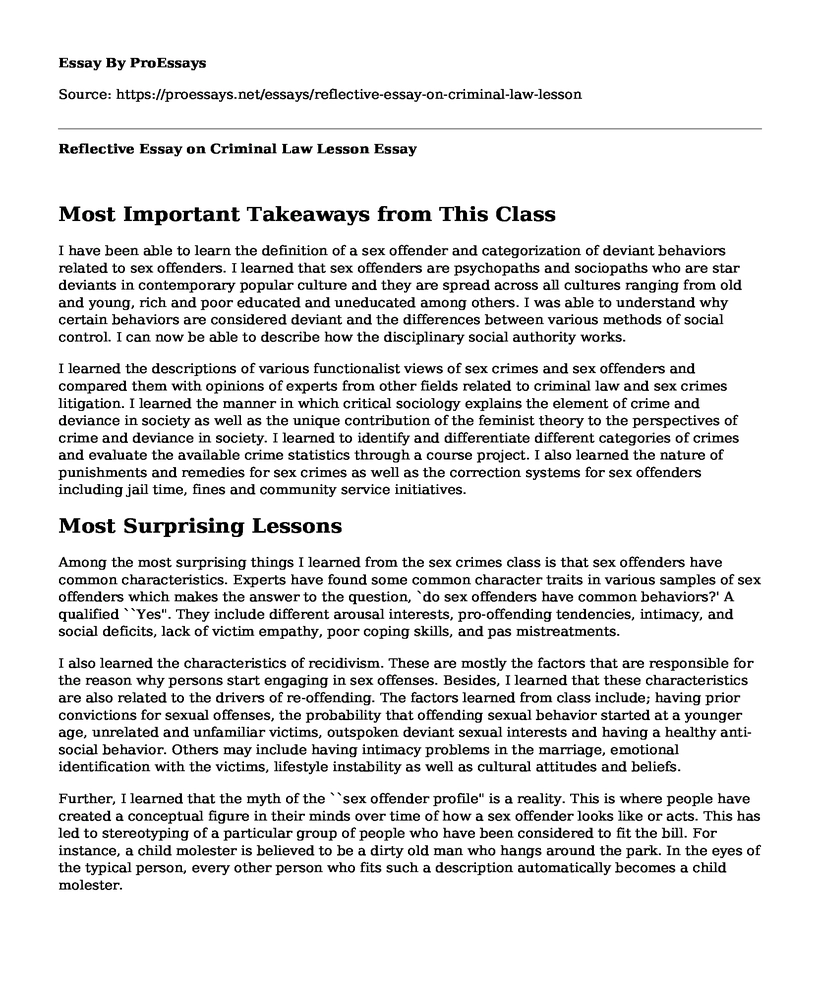Most Important Takeaways from This Class
I have been able to learn the definition of a sex offender and categorization of deviant behaviors related to sex offenders. I learned that sex offenders are psychopaths and sociopaths who are star deviants in contemporary popular culture and they are spread across all cultures ranging from old and young, rich and poor educated and uneducated among others. I was able to understand why certain behaviors are considered deviant and the differences between various methods of social control. I can now be able to describe how the disciplinary social authority works.
I learned the descriptions of various functionalist views of sex crimes and sex offenders and compared them with opinions of experts from other fields related to criminal law and sex crimes litigation. I learned the manner in which critical sociology explains the element of crime and deviance in society as well as the unique contribution of the feminist theory to the perspectives of crime and deviance in society. I learned to identify and differentiate different categories of crimes and evaluate the available crime statistics through a course project. I also learned the nature of punishments and remedies for sex crimes as well as the correction systems for sex offenders including jail time, fines and community service initiatives.
Most Surprising Lessons
Among the most surprising things I learned from the sex crimes class is that sex offenders have common characteristics. Experts have found some common character traits in various samples of sex offenders which makes the answer to the question, `do sex offenders have common behaviors?' A qualified ``Yes". They include different arousal interests, pro-offending tendencies, intimacy, and social deficits, lack of victim empathy, poor coping skills, and pas mistreatments.
I also learned the characteristics of recidivism. These are mostly the factors that are responsible for the reason why persons start engaging in sex offenses. Besides, I learned that these characteristics are also related to the drivers of re-offending. The factors learned from class include; having prior convictions for sexual offenses, the probability that offending sexual behavior started at a younger age, unrelated and unfamiliar victims, outspoken deviant sexual interests and having a healthy anti-social behavior. Others may include having intimacy problems in the marriage, emotional identification with the victims, lifestyle instability as well as cultural attitudes and beliefs.
Further, I learned that the myth of the ``sex offender profile" is a reality. This is where people have created a conceptual figure in their minds over time of how a sex offender looks like or acts. This has led to stereotyping of a particular group of people who have been considered to fit the bill. For instance, a child molester is believed to be a dirty old man who hangs around the park. In the eyes of the typical person, every other person who fits such a description automatically becomes a child molester.
Most Significant Elements
My take is that the applications of criminal law in litigation of sex offenses will be important to my career both currently and in the future. I believe the moral, ethical lessons from the class will be important in understanding the personal dynamics of sex offenders today and will be useful in future research about the relationship between social dynamics and sex offending.
Cite this page
Reflective Essay on Criminal Law Lesson. (2022, Aug 10). Retrieved from https://proessays.net/essays/reflective-essay-on-criminal-law-lesson
If you are the original author of this essay and no longer wish to have it published on the ProEssays website, please click below to request its removal:
- Essay Example: Immigrants Drain US Economy
- The Impact of Technology on Children's Development Essay
- Techniques for Teaching English to Children Essay
- Essay Sample on Provision of Public Services
- Essay Example on Human Trafficking: Karla Jacinto's Case & Controls Needed
- Essay Sample on Technological Advancements in Criminal Justice: Safeguarding Cities & Enhancing Legal Cases
- Homelessness & Quality Healthcare: A Global Challenge - Essay Sample







